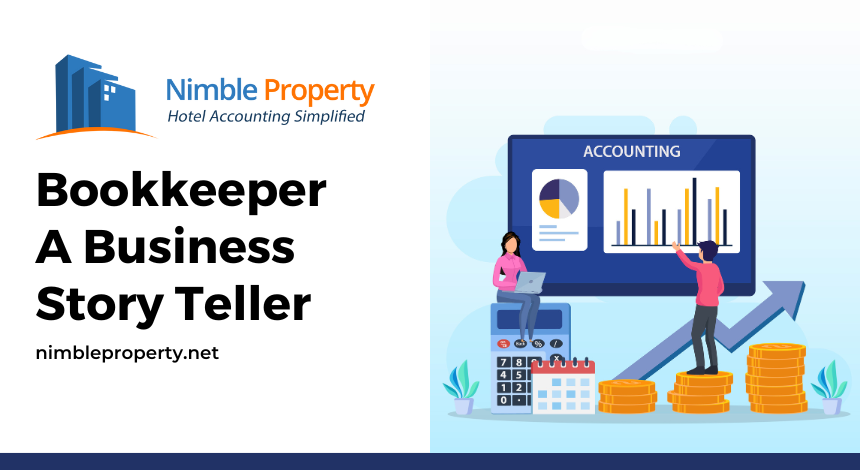One who loves numbers becomes the best bookkeeper. His accurate record maintenance tells the true story of any business. His continuous efforts to keep all your respective ledgers organized all the time, prepares you ready for the tax season. And your financial reports to bring investment to your business. A bookkeeper is an accounting specialist, task master who keeps your spirits high with précised accounting books.
From managing complex paper work to manage accounts using the Artificial Intelligence enabled Hotel accounting software, a bookkeeper has upgraded himself with the changing times. He has evolved through tough times and it is all possible only through his love for numbers. From basic invoice processing to complex tax filing, he helps the businesses to manage finances impeccably. This elaborative discusses the tasks performed by a bookkeeper, with industry specific hotel accounting system.
All the accounting tasks handled by the bookkeeper speaks about the monetary health of a business. Some businesses offer virtual bookkeeping service with 24/7 assistance and there are freelancers available to simplify your tasks as well.
Detailed Reconciliation of bank and credit card statements.
A modern-day bookkeeper has many tools, to reconcile your bank accounts with business transactions usually credit and debit card transactions. It is one of the crucial stages of the accounting system, if the error is spotted, it can be fixed immediately. This is immense transaction from paper-based documentation to paper free automated software. Most of the software’s’ including Nimble Hotel Accounting System has auto bank reconciliation feature, where every transaction gets automated without any manual effort. As hotel business deals with a complete day-to-day transaction, a bookkeeper pays much attention and carefully examines all the transactions checks whether they are accounted in their respective ledgers or not. Nimble offers a weekly reconciliation updates to the clients through its support team.
Performing variance analysis and identifying the open items.
A crucial financial tool is variance analysis, which looks for differences between projected or budgeted financial outcomes and actual outcomes. It basically assists firms in identifying areas such as sales, expenses, or profits where they have outperformed or underperformed in comparison to their plans.
Variances can be classified as advantageous or disadvantageous. When actual performance above budgeted expectations, there is a favorable variation; when there is a shortfall, there is an unfavorable variance. In order to properly handle these deviations, companies must recognize and take care of outstanding problems, or “open items.” There are still unresolved differences between the budgeted and actual amounts.
Here, reconciliation is important since it requires comparing records to guarantee correctness in accounts such as payables and receivables. Finding and fixing these outstanding issues.
Payroll reconciliation with Payroll statements
An essential financial process that guarantees accuracy and compliance in employee remuneration is payroll reconciliation with payroll statements. This procedure entails confirming that the data kept by the payroll system correspond with the real payroll statements, which include information on wages, deductions, taxes, and other relevant costs.
Payroll statements offer comprehensive analyses of workers’ earnings, including gross pay, overtime, bonuses, and perks and tax deductions deducted. These statements must take gratuities, shift differentials, and allowances into consideration in the hospitality industry. For a variety of staff types, such as hourly and salaried personnel, reconciliation is crucial, and it must appropriately represent the pay of temporary or seasonal workers. It also entails verifying that the claimed tips from staff members correspond with the amounts documented. adherence to labor laws and rules, including those pertaining to taxes and minimum wages.
Recording accruals for Revenue and Expense wherever applicable
Accurate financial reporting requires the recording of accruals for both revenue and expenses. Instead of recording income and expenses when cash transactions take place, accrual accounting records them when they are earned or incurred. Accounting for generated revenue from advance bookings, group reservations, or long-term contracts—even if payment is not received right away—is known as revenue accruals.
For instance, until the stay happens, advance payments for future hotel reservations are recorded as accumulated income. Similar to this, expense accruals guarantee that, even in cases when invoices are received later, costs like maintenance, salaries, and utility bills are recorded in the period in which they are incurred. This procedure guarantees that event-driven revenues and operating expenditures are appropriately recorded while also assisting in managing the hotel’s financial performance across variable seasons.
Detailed Presentation of Financial Statements
To adequately represent the distinct operations, income sources, and costs related to hotel management, a comprehensive financial statement presentation is required.
Stakeholders can better grasp the hotel’s operational effectiveness and financial stability thanks to this thorough information. The essential elements consist of: Revenue is divided into three categories on the Income Statement: room revenue, sales of food and beverages, and other operating revenues from parking and spa services.
Additionally, it lists all operating costs, classifying them as fixed or variable and differentiating between departmental expenditures (like cleaning and food services) and undistributed costs (such managerial salaries and utilities).
Gross Operating Profit (GOP), which emphasizes operational effectiveness, and EBITDA and Net Income, which offer information on profitability both before and after all costs are taken into account, are important indicators in this context.
Conclusion:
All the above-mentioned tasks are effectively managed by a bookkeeper, Nimble Property has a dedicated team of certified professionals to look after the clients’ books. The services ensure great security along with confidentiality. And the financial storyteller continuously strives to keep your spirits high.
Register and See a Demo for Free

